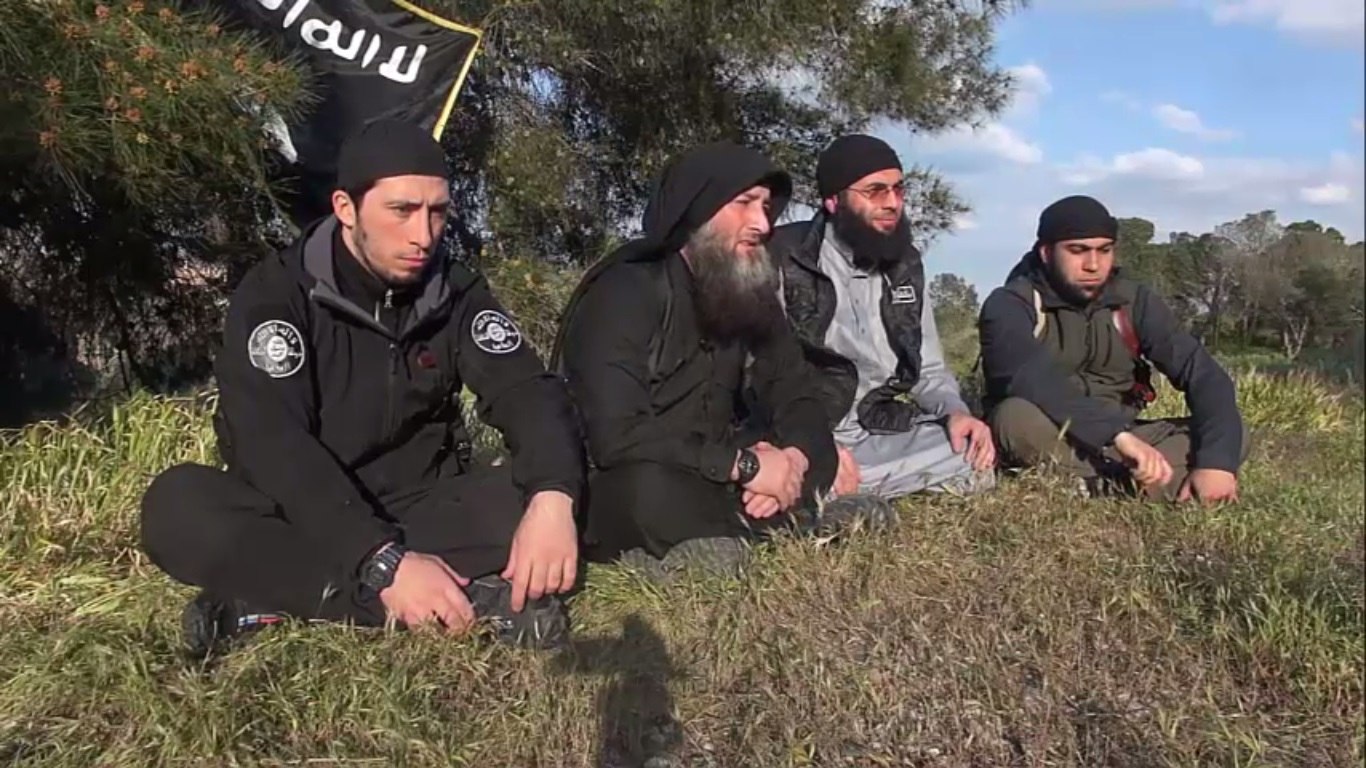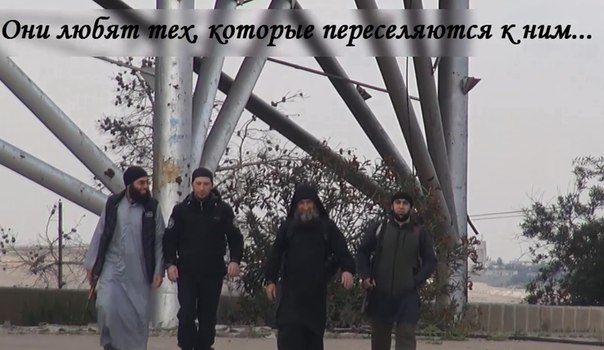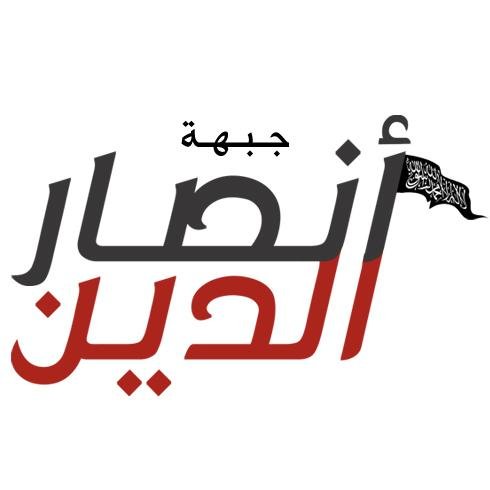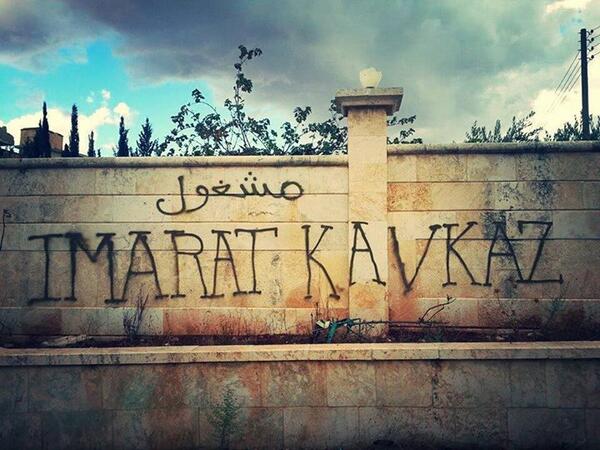
Click the following link for a safe PDF copy: Wilāyah Dagestān of Imārat al-Qawqāz — “Disclaimer”
_____________
To inquire about a translation for this statement for a fee email: [email protected]
Category: Jaysh al-Muhajirin wa-l-Ansar
GUEST POST: Umar Shishani's Right-Hand Man Calls On North Caucasian Jihadis To Join IS In Dagestan & Chechnya
NOTE: As with all guest posts, the opinions expressed below are those of the guest author and they do not necessarily represent the views of this blogs administrator and does not at all represent his employer at the Washington Institute for Near East Policy.
Jihadology.net aims to not only provide primary sources for researchers and occasional analysis of them, but also to allow other young and upcoming students as well as established academics or policy wonks to contribute original analysis on issues related to jihadism. If you would like to contribute a piece, please email your idea/post to azelin [at] jihadology [dot] net.
Click here to see an archive of all guest posts.
—

Umar Shishani’s Right-Hand Man Calls On North Caucasian Jihadis To Join IS In Dagestan & Chechnya
By Joanna Paraszczuk
In a recent video address, Abu Jihad, a close confidante of Islamic State’s commander in Syria Umar Shishani, has called on jihadis in the North Caucasus to join those local groups who have pledged allegiance to IS Emir Abu Bakr al-Baghdadi, and not the Caucasus Emirate (CE)
Abu Jihad is the nom de guerre of Islam Seit-Umarovich Atabiyev, an ethnic Karachay from the North Caucasian republic of Karachay-Cherkessia. While Abu Jihad does not appear to have taken part in any military action on behalf of IS, in 2013 and 2014 he was frequently seen alongside Umar Shishani and has since become a prominent ideologue within IS’s North Caucasian contingent. More recently, he has begun reaching out to jihadis in Syria and the Russian Federation via regular Russian-language audio lectures on the Zello platform.
Abu Jihad’s latest move is a bold attempt at control and domination of the Islamist insurgency in the North Caucasus as well as of Russian-speaking jihadis in Syria. His video address (made before the April 19 assassination in Dagestan of CE Emir Ali Abu Mukhammad) should be viewed as the latest development in the ongoing and increasingly fierce power struggle between Umar Shishani’s North Caucasians in IS and those in the CE and its affiliate in Syria.
That struggle is in part an ideological battle over who is waging “real” jihad in Syria and the North Caucasus, but at its root it is a fight for actual power and a quest to win over the hearts and minds of North Caucasian jihadis and recruit them to Abu Jihad’s cause.
As the rift has grown between IS and the CE — both in the North Caucasus and in the CE’s self-proclaimed Syrian affiliate Jaish al-Muhajireen wal-Ansar (JMA) — Abu Jihad has increasingly promoted the ideological supremacy of IS over the CE, often setting himself up in direct opposition to CE Emir Ali Abu Mukhammad and other CE leaders in the North Caucasus, as well as to JMA Emir Salakhuddin Shishani.
Abu Jihad’s latest address takes his opposition to the CE a dramatic step further than he has previously dared. Rather than simply calling on North Caucasian jihadis to join IS in Syria, Abu Jihad has now positioned himself in the role of a North Caucasian insurgent leader with the authority to instruct jihadis how to wage jihad in the North Caucasus. His bold move comes amid a growing sense of confidence among IS’s North Caucasian faction, sparked by a series of pledges of allegiance to IS by jihadis mostly in Dagestan and who had previously been loyal to the CE.
WAGE JIHAD — BUT AT HOME
Abu Jihad made his announcement in an video titled He Loves Those Who Migrate To Him (in Russian: Он любит тех, которые переселяются к ним), a transcript of which was shared widely on social media and pro-IS websites including the relatively new Vaynah.org site in late March and early April. Abu Jihad appears in the video alongside three Dagestanis: Akhmad Medinsky (a Salafi preacher whose addresses are widely shared on pro-jihad accounts on Russian social media), Abdullakh Abu Mukhammad and Abbas Abu Aisha, all of whom have come to Syria and sworn allegiance to IS Emir Abu Bakr al-Baghdadi.
Abu Jihad starts by addressing those militants in the North Caucasus who had been affiliated with the CE and who defected to IS in December 2014.
“We say salam [greetings] to all our brothers in the Caucasus who swore allegiance to the Caliphate. Our beloved brothers, we welcome you and we do not forget you in our prayers and our struggles and your victories are our victories,” Abu Jihad says.
Abu Jihad does not just welcome and praise the IS-affiliated jihadis in the North Caucasus for their decision to pledge allegiance to Baghdadi, however.
Instead, he explicitly links the insurgency in the North Caucasus to IS’s struggle in Syria and Iraq, saying that those North Caucasian jihadis who have left the CE and gone over to IS are fighting the “Russian invaders,” the implication being that the CE is not doing so (or not effectively) and that it is IS’s place to do so.
Abu Jihad then calls on North Caucasians who want to wage jihad to join IS-affiliated groups in the region, and fight the Russians, rather than come to Syria.
“Those who wish to join the caravan of the Mujahideen, the caravan of the Caliphate and the caravan of jihad, I want to encourage those brothers to join those brothers in the Caucasus who gave bay’ah [an oath of allegiance] to the Caliphate, those who are struggling against the Russian invaders and against the apostates,” Abu Jihad said.
It is only those who “cannot find brothers there [in the North Caucasus] and join with them” who are permitted to travel to Syria and join IS there, according to Abu Jihad.
“Those who have access to those brothers of the Mujahideen who gave an oath to the caliphate, there must join them and help them in the difficult struggle, because they need your help,” Abu Jihad clarified.
UNDERMINING ALI ABU MUKHAMMAD (AND HIS SUCCESSOR…)
Abu Jihad’s speech, made in late March, was a personal attack on the then-CE Emir Ali Abu Mukhammad al-Dagestani– the first non-Chechen leader of Islamist insurgents in the North Caucasus. In a videotaped address last year, Ali Abu Mukhammad slammed North Caucasians who joined IS has having “plastic brains” and snubbed Abu Jihad, saying he had never even heard of him.
More than this, however, Abu Jihad is openly attempting to undermine the CE’s ability to recruit as well as retain fighters by calling on potential recruits in the North Caucasus to join IS rather than the CE. He is also usurping the authority of the CE leadership to make decisions where jihad should be waged.
In the past, the CE leadership has made a similar call to North Caucasian militants, urging them to stay at home and wage jihad against Russia rather than travel to Syria. That call was, of course, made out of concerns that CE’s existing and potential recruits would abandon the North Caucasus for what appeared to be a more glamorous fight in Syria, either with the CE’s Syrian affiliate JMA or with IS.
The attempt by IS’s North Caucasian faction to extend control over the Islamist insurgency in the North Caucasus will likely be more effective now that Ali Abu Mukhammad has been been killed. Both Russia’s National Antiterrorism Committee (NAK) and CE sources confirmed on April 20 that the CE Emir had died in clashes with Russian security forces in Buinaksk, Dagestan.
It is too soon to know whom the CE will name as a successor to Ali Abu Mukhammad. But it is likely that, with the CE currently leaderless and weakened, IS and IS-sympathizers in the North Caucasus will be able to increase their influence both in the region and possibly also over North Caucasian groups in Syria.
It is possible that the death of Ali Abu Mukhammad could even herald the demise of the CE in its existing structure and result in the umbrella group becoming even more fractured, perhaps with a split between the Dagestani and Chechen Vilayats, or districts, especially if more groups in Dagestan move over to IS. Such a fracturing of the CE would likely see IS gain more traction particularly in Dagestan, where it has already gained a foothold. What is not clear, however, is if such a shift to IS would render the North Caucasian insurgency any more effective, or whether it would be a shift in name only. So far, there has been no evidence that the defection by Dagestani CE groups has led to any practical advantages, and no sign that IS in Syria/Iraq is interested in sending money, fighters or weapons to support its North Caucasus sympathizers.
REAL IDEOLOGICAL DIFFERENCES OR JUST SPIN?

One subtext of Abu Jihad’s speech is that the ideology of jihad preached by IS is the correct one, while that of the CE is not only wrong, but irrelevant.
The ideological struggle over which group is waging the “correct jihad” has underpinned the now enormous rift between IS’s North Caucasian faction and the Caucasus Emirate and its affiliate in Syria, Jaish al-Muhajireen wal-Ansar (JMA). Caucasus Emirate leader Ali Abu Mukhammad has said that North Caucasians in Syria should have backed Syrian Al Qaeda affiliate Jabhat al-Nusra rather than IS.
There are problems with Abu Jihad’s sudden call for North
GUEST POST: Jeish al-Muhajireen wal-Ansar Shar'is Debate Islamic Rule Inside and Outside the 'Islamic State'
NOTE: As with all guest posts, the opinions expressed below are those of the guest author and they do not necessarily represent the views of this blogs administrator and does not at all represent his employer at the Washington Institute for Near East Policy.
Jihadology.net aims to not only provide primary sources for researchers and occasional analysis of them, but also to allow other young and upcoming students as well as established academics or policy wonks to contribute original analysis on issues related to jihadism. If you would like to contribute a piece, please email your idea/post to azelin [at] jihadology [dot] net.
Click here to see an archive of all guest posts.
—
By Sam Heller
Below we see Jeish al-Muhajireen wal-Ansar (JMA) shar’i “Abu Azzam al-Najdi’s” frank rationale for leaving JMA to join the Islamic State (IS / ISIS). Jeish al-Muhajireen wal-Ansar is a mostly foreign fighter battalion that has been active in Aleppo. It is best known for its Caucasian (e.g., Chechen) contingent, but it also counts Arabs among its ranks — it recently absorbed the heavily Saudi al-Katibah al-Khadra (the Green Battalion), and Abu Azzam’s nom du guerre indicates that he hails from the Najd (east Saudi Arabia). Abu Azzam had been JMA’s shar’i and, at least in Arabic media, its main fundraising point of contact. Saudi fundraiser and ideologue Abdullah al-Muheisini had recommended as late as April that any would-be foreign fighters should reach out specifically to Abu Azzam.
Abu Azzam defected to ISIS alongside a substantial chunk of al-Katibah al-Khadra, including its commander Omar Seif and at least one of its shar’is. (Seif had apparently just been detained by the Syrian Revolutionaries Front on suspicions, now vindicated, that he was linked to ISIS. Other jihadists intervened to broker his release.)
As can be seen below, there are a number of strains to Abu Azzam’s thinking, or at least what he’s willing to disclose of it. Some of it reads like picking a winner: on the one hand, an endorsement of ISIS’s success in building a functional Islamic state; on the other, disillusionment with the dysfunction of rebel-controlled areas and a clear distrust of non-jihadist rebels. The current U.S./Coalition campaign on ISIS apparently figures into his logic, too, pushing him to advocate jihadist solidarity with ISIS to better resist “the nations of disbelief.”
ISIS and pro-ISIS accounts have been crowing about successive jihadist defections to ISIS, doing everything they can to advertise ISIS’s continuing momentum. When it comes to drawing away foreign fighters, I suspect they’re right – Abu Azzam is not the first to defect to ISIS, and I doubt he’ll be the last.
Translation follows:
I’ve been asked a lot about my reason for leaving [Jeish al-Muhajireen wal-Ansar] and pledging allegiance to the Islamic State.
I would say, frankly, that no one has a successful plan to implement God’s law except the Islamic State. It has established Islamic courts and implemented the hudoud (Islamic criminal punishments) in its territory. Meanwhile, if we go and look at the other side, we find not only sincere battalions but also – on the same land – criminal battalions and apostate battalions supported by the military councils that call openly for the establishment of a democratic state. Then we fight on the fronts while they work behind us to carry out their projects and plots… Yes, there are those who work [at that], but they’ll never succeed – although only God knows – because of their division and fragmentation. Even the courts that have been established have seen what they’ve seen because of nepotism and what have you…
You might say that the [Islamic] State has made mistakes. I say that they themselves admit these mistakes, and they work to rectify them and hold accountable the responsible party. They’ve established Islamic courts and implemented the hudoud, so you see nothing here but the rule of Islamic law. Stores close at prayer time, women are modest in the markets, nobody sells cigarettes or anything else.
I say this is not the time for division with the Islamic state. The nations of disbelief have gathered against us, so we must come to [the Islamic State’s] aid. This is not the time for the division of “groups.” Rather, it is the time for solidarity and union.
Below are Abu Azzam’s original tweets:
١- الحمد لله رب العالمين والصلاة والسلام على أفضل الخلق نبينا محمد وعلى آله وصحبه أجمعين.. سألت كثيرا سبب خروجي ومبايعتي للدولة الإسلامية..
— ابو عزام النجدي (@aboazaam122) October 21, 2014
New video message from Jaysh al-Muhājirīn wa-l-Anṣār: "Congratulations To the Muslims On A Blessed ‘Īd al-Fiṭr"

____________
To inquire about a translation for this video message for a fee email: [email protected]
New video message from Jabhat Anṣār al-Dīn: "Announcing Jabhat Anṣār al-Dīn: Consisting Of Ḥarakat Shām al-Islām, Jaysh al-Muhājirīn wa-l-Anṣār, Katībat al-Khaḍrā', and Ḥarakat Fajr al-Shām"

___________
To inquire about a translation for this video message for a fee email: [email protected]
The Clear Banner: "The Clash Over 'Real Jihad' in Syria: ISIS vs. the Caucasus Emirate"
NOTE: For prior parts in the Clear Banner series you can view an archive of it all here.
—
The Clash Over ‘Real Jihad’ in Syria: ISIS vs. the Caucasus Emirate

By Joanna Paraszczuk
The ongoing hostilities between the Islamic State of Iraq and a-Sham (ISIS) and Syrian brigades have exacerbated a pre-existing rift between rival North Caucasian factions in Syria, specifically Umar Shishani’s faction in ISIS and his former brigade Jaish al-Muhajireen wal-Ansar, which considers itself aligned to the Caucasus Emirate.
Essentially a struggle for prestige among North Caucasian jihadis in Syria and their supporters, the North Caucasian infighting has grown out of an ideological battle over which faction has the “correct” approach to jihad in general and the jihad “back home” in the North Caucasus in particular; how the jihad in Syria relates to the Caucasus Emirate’s struggle in the North Caucasus; and the circumstances under which North Caucasians may wage jihad in Syria instead of at home.
The ongoing debate has raised key questions not only about where North Caucasian jihadis’ loyalties should lie, but also about the nature of jihad in the North Caucasus and its relationship to jihad in other parts of the world. Is the North Caucasian struggle primarily a local, ethno-national battle restricted to “lands ruled by the Russian kuffar” (in which case North Caucasians ought to stay at home and fight there)? Or is it just one small part of a wider, transnational movement focussed on establishing a global Caliphate, a struggle that knows no national boundaries?
These difficult questions have been addressed by North Caucasians in Syria, by the Caucasus Emirate leadership itself and by pro-Caucasus Emirate outlets like Kavkaz Center. Moreover, against the background of the ongoing hostilities between the Islamic State of Iraq and as-Sham and Syrian brigades, this debate has become an integral element of a growing ideological rift between North Caucasians loyal to ISIS and those loyal to the Caucasus Emirate.
ORIGINS OF CHECHEN FIGHTERS IN SYRIA
The exact number of Chechen jihadis in Syria is unknown (and in any case numbers are fluid, as fighters are killed and new recruits enter Syria). Estimates have varied from around 200 to as many 1,700 fighters (the latter figure was given by the Russian Embassy in Damascus and is likely exaggerated).
Regardless of their numbers, these Chechen jihadis can be divided into four groups. The largest group are ethnic Chechens who had been living in Europe as migrants or refugees. The second-largest group is ethnic Chechens from Georgia’s Pankisi Gorge. Russian-language news site Kavkazskii Uzel estimates there are around 200 Pankisi Chechens in Syria, the most prominent of whom is ISIS military emir Umar Shishani. The third group are Chechens who came from Chechnya itself. Estimates of this group vary from 30-100 fighters and these include fighters from “Tarkhan’s jamaat”, the faction of Chechen commander Tarkhan Ismailovich Gaziyev, who split from Dokku Umarov in 2010. The smallest group consists of veterans of the Russo-Chechen wars, the most well-known of whom is Muslim Abu Walid Shishani who fought with Emir Khattab in Chechnya from 1995. Abu Musa Shishani, of whom little is known, is a seasoned fighter and is also likely a Chechen war veteran.
THE CAUCASUS EMIRATE’S POSITION ON THE SYRIAN JIHAD
The Caucasus Emirate (CE), officially declared on 31 October 2007 by a group of North Caucasian jihadis led by Dokku Umarov, has been described as a “transnational entity that extends beyond the Caucasus to encompass all Muslims oppressed by ‘Rusnya’” [i.e. Russia]. Umarov (whose death was announced on 18 March) expressed opposition to North Caucasian fighters traveling to Syria to wage jihad. In a November 2012 video address, Umarov accused those who had gone to Syria of undermining jihad at home, warning that these fighters were not waging jihad but simply trying to replace one taghut for another:
There are people going there [to Syria] who are saying that there is no jihad in the Caucasus, that jihad in the Caucasus is over, and therefore they allegedly went to Syria. No, there is jihad in the Caucasus, and it is more brutal and more severe than in Syria. No one provides help or support for jihad in the Caucasus.
However, by summer 2013, just before the first splits began to appear in the Chechen ranks, it seemed the CE was – at least in part – reevaluating this view, with CE-linked publications like Kavkaz Center beginning to report positively on Chechen fighters in Syria. As one analyst has argued, this move was likely, at least in part, an attempt to assert authority over Chechen jihadis in Syria, who appeared to be gaining in power and prestige.
While the Caucasus Emirate hardly expressed its full support for North Caucasians going to Syria to wage jihad, via its media outlets it moved toward the admission that this was permissible, if only for those who were not in a position to wage jihad back home. In other words, jihad in the North Caucasus should take priority over that in Syria, but the North Caucasian and Syrian jihads were part of the same global struggle of Islam against the kuffar.
Kavkaz Center hinted at this new position in July 2013 through a “letter to the editor” (purportedly) written by one Umm Sayfullah of Uruz Marten:
“The issue I want to discuss is jihad in Syria and the Caucasus. And even though several articles and fatwas have been published on this matter, the situation has not been clarified.
Jihad in Syria started after the jihad in the Caucasus, in Afghanistan, Iraq, Palestine, where the Holy Al-Quds has for several decades been occupied by the kuffar, but it’s the jihad in Syria that has become most popular among Russian-speaking followers of Islam, and even Caucasian Muslims, who are going to Syria in entire jamaats.
In connection with this, I want to raise the question — is it not a priority for Caucasian Muslims to wage jihad in the Caucasus? Allah is my witness, I’m not against brothers going to Sham. But isn’t fighting the kuffar in the Caucasus more important for Muslims from this area?
In Syria, as we know, Muslims are coming from all Arab countries, and also from Turkey, Pakistan, Southeast Asia, Europe, and America… So what about the Caucasus? It is right for Muslims to leave the fight at home and go to another area?
I understand that the jihad in Syria needs Mujahideen. We see how the kuffar, Shi’ites from all over the globe are joining in the war against Sham and this is a serious issue. But for Caucasians, in my view, the priority has to be jihad in their native home. After all, the hardest jihad is in the Caucasus today! …
I think that Emirs in the Caucasus and in Syria need to explain to people, that those Caucasian brothers who can join the jihad in the Caucasus must in the first instance try to go there. And in the event that there is no way for them to get there or if there is some major reason — then they can go elsewhere.
Those brothers from Syria, who ask for help, must absolutely explain that they are talking about those who cannot wage jihad for the Caucasus Emirate. And that for Caucasians, jihad at home is more important and the first priority over jihad in any other place.”
Two weeks later, on July 30, 2013, this message was further reinforced in a a video address — also published on Kavkaz Center — by a Chechen fighter named Salahuddin Shishani, at the time the commander of a group named az-Zubеyr. Salahuddin, who had been named the “official representative of the Caucasus Emirate in Syria” was therefore presumably also speaking in that faction’s name when he addressed “the Muslims of the Caucasus, Crimea, and other Muslim lands occupied by the Russian kuffar”. In other words, this is not an address intended for Muslims or Mujahideen in general, but for those under the ideological sway of the Caucasus Emirate.
In the video, Salahuddin – whose affiliation to the Caucasus Emirate further emphasized by his sartorial choice of an “Imarat Kavkaz” logoed t-shirt – repeats the message given in Umm Sayfulla’s letter, but goes beyond this by placing the issue of where North Caucasians should wage jihad in the context of a more global cause. It is understandable, he notes, that Muslims from countries where there is no jihad or where it is not possible to wage jihad should come to Syria. However, he cautions, such a move is “not correct” for those in places where there is already jihad, such as Libya, Kashmir “or our Caucasus”. Notably, Salahuddin also refers clearly to Dokku Umarov’s authority by noting that the CE leader gave an explicit order for North Caucasians to wage jihad against the Sochi Olympics, an order which must take priority to the jihad in Syria, at least for those able to fulfill it.
SPLITS IN THE RANKS
Infighting among North Caucasian fighters in Syria began as early as August 2013. By summer 2013, many if not most Chechen fighters were part of the Jaish al-Muhajireen wal-Ansar brigade (JMA), commanded by a charismatic, ginger-bearded jihadi named Umar Shishani.
By August, however, there were already signs of tensions among North Caucasian jihadis.
One cause of the tensions was the decision by Umar Shishani to take on the role of ISIS military emir in northern Syria. Although at that stage he had not formally sworn allegiance to ISIS nor did he move for JMA to be absorbed into join ISIS, the predominantly North Caucasian faction was de facto fighting as part of ISIS, most notably in the battle for Menagh Airbase in Aleppo.
In August, Umar very publicly expelled a group of about 27 Chechens headed by Sayfullah Shishani, a charismatic and volatile ethnic Chechen who was formerly Umar’s
